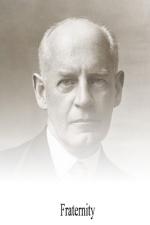When Mr. Stone had finished, he sat back in his chair with closed eyes. A supreme silence reigned in the bare room above those two men of different generations and of such strange dissimilarity of character. Hilary broke that silence.
“I heard the cuckoo sing to-day,” he said, almost in a whisper, lest Mr. Stone should be asleep.
“The cuckoo,” replied Mr. Stone, “has no sense of brotherhood.”
“I forgive him-for his song,” murmured Hilary.
“His song,” said Mr. Stone, “is alluring; it excites the sexual instinct.”
Then to himself he added:
“She has not come, as yet!”
Even as he spoke there was heard by Hilary a faint tapping on the door. He rose and opened it. The little model stood outside.
CHAPTER XXIX
RETURN OF THE LITTLE MODEL
That same afternoon in High Street, Kensington, “Westminister,” with his coat-collar raised against the inclement wind, his old hat spotted with rain, was drawing at a clay pipe and fixing his iron-rimmed gaze on those who passed him by. It had been a day when singularly few as yet had bought from him his faintly green-tinged journal, and the low class of fellow who sold the other evening prints had especially exasperated him. His single mind, always torn to some extent between an ingrained loyalty to his employers and those politics of his which differed from his paper’s, had vented itself twice since coming on his stand; once in these words to the seller of “Pell Mells”: “I stupulated with you not to come beyond the lamp-post. Don’t you never speak to me again—a-crowdin’ of me off my stand”; and once to the younger vendors of the less expensive journals, thus: “Oh, you boys! I’ll make you regret of it—a-snappin’ up my customers under my very nose! Wait until ye’re old!” To which the boys had answered: “All right, daddy; don’t you have a fit. You’ll be a deader soon enough without that, y’know!”
It was now his time for tea, but “Pell Mell” having gone to partake of this refreshment, he waited on, hoping against hope to get a customer or two of that low fellow’s. And while in black insulation he stood there a timid voice said at his elbow—
“Mr. Creed!”
The aged butler turned, and saw the little model.
“Oh,” he said dryly, “it’s you, is it?” His mind, with its incessant love of rank, knowing that she earned her living as a handmaid to that disorderly establishment, the House of Art, had from the first classed her as lower than a lady’s-maid. Recent events had made him think of her unkindly. Her new clothes, which he had not been privileged to see before, while giving him a sense of Sunday, deepened his moral doubts.
“And where are you living now?” he said in tones incorporating these feelings.
“I’m not to tell you.”
“Oh, very well. Keep yourself to yourself.”




